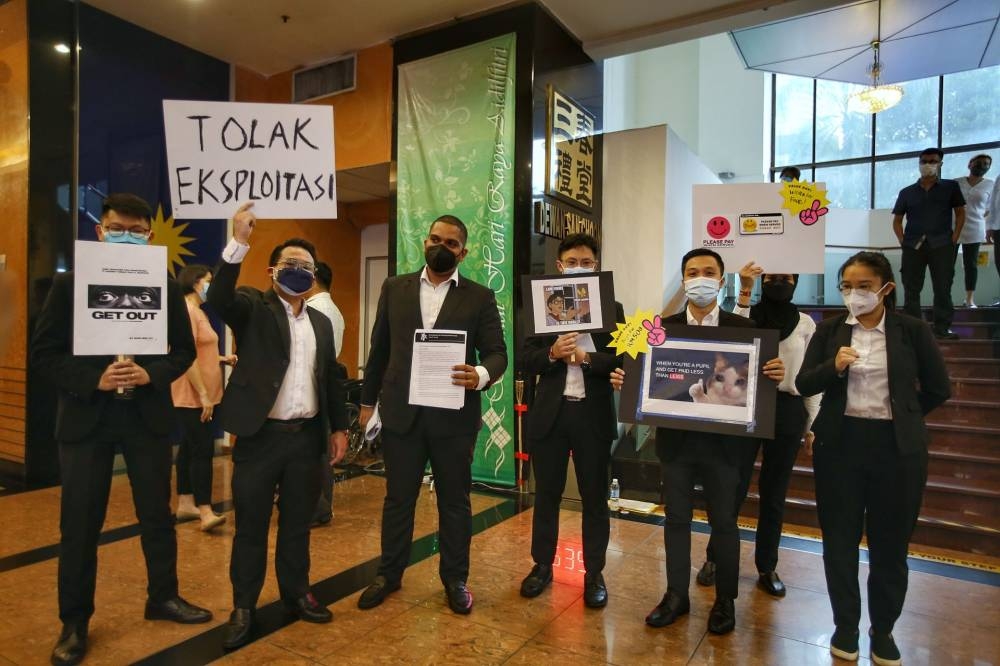KUALA LUMPUR, May 27 — The Malaysian Bar should put in place a binding ruling for law firms to start paying a minimum salary to pupils or chambering students to protect them from alleged exploitation, instead of introducing it as a guideline which law firms can choose to ignore, a group of young lawyers said today.
Pupils or chambering students typically undergo nine months of training under senior lawyers, before they apply to the court to officially be admitted to the legal profession as lawyers.
Young Lawyers Movement spokesman Goh Cia Yee said he had raised the same issue of minimum pay for pupils or chambering students two years ago, and that this issue was being raised again as the young lawyers had yet to receive what they asked for.
Goh noted that the Malaysian Bar had often cited Section 42(1)(a) of the Legal Profession Act to highlight its purpose of upholding the cause of justice and argued that this should extend to justice related to labour rights.
“Well, it is our position that justice is not just freedom of speech, freedom of assembly. Justice involves socio-economic justice and labour rights, there needs to be protection for those rights.
“And the Bar cannot say it is fulfilling its purpose without having done the right thing by ensuring that there is justice within the profession itself. The lens that has been used to view outside the profession must be used to view internally,” he told reporters here at Wisma MCA where the Malaysian Bar was holding an extraordinary general meeting (EGM).
Goh argued that priority should be given to living entities or individuals as compared to business entities, expressing his view that business entities would be able to take an increase in the cost of paying pupils and that there could be pupils with family circumstances who would be unable to afford receiving low pay.
While noting that the Malaysian Bar intends to implement minimum pay, Goh questioned if it would be in the form of guidelines which would be non-binding on law firms and which he suggested would be ineffective as compared to a binding ruling.
“I think we need something binding, that’s one of the reasons why we are here today, because we disagree with what the Malaysian Bar has said,” he said.
The two demands by the Young Lawyers Movement today are for a direct election of Bar Council members to ensure views made by the Malaysian Bar reflect its members’ views, and for the Malaysian Bar to confirm whether the minimum remuneration for pupils would be done through a guideline or a ruling.

Vince Tan, another spokesman of the Young Lawyers Movement, said this issue of low allowance to pupils is not a new issue and that it has goes on at least for a decade as there is no minimum amount set.
Tan said the Young Lawyers Movement has about 12 persons as part of its core team, and over 150 persons in its network or loose coalition of young lawyers, with feedback received from across different states showing that the highest allowance to chambering students being RM4,000 while the lowest was RM300.
He said there is frequently a championing of basic human rights and workers’ rights in line with international laws, but argued that there is still “systematic exploitation” in Malaysia and pupils are yet to be recognised as employees.
He argued that the Malaysian Bar should prioritise the welfare of its members first over issues such as the judiciary’s independence, and claimed that progress has been slow on the matter of minimum pay for pupils.
Saying that the young lawyers were not seeking for publicity or positions within the Bar Council, Tan said that they were highlighting the issue out of necessity and wanting to “see things done” and to “end the suffering” faced by junior lawyers and their peers.
He also claimed that there was previously a culture of fear, but said young lawyers are now more outspoken to voice out on this issue.
“We are not here to attack the legal profession or attack the Malaysian Bar, we are here to make things better. This is constructive criticism.
“We have come out with a proper proposal that this should be implemented, we should not use this excuse of small firms are not able to afford it when Malaysia has achieved globalisation, industrialisation, corporatisation. That means the legal profession is not moving forward according with the times,” he said.

Khairul Shahrizan, who is the sole proprietor of a law firm with four other lawyers, said at the same event that he was prepared as a small firm owner to pay RM3,000 per month to chambering students.
Noting that lawyers have to be in practice for at least seven years before they could take in pupils, he said: “If you have been in practice for seven years, and you say you cannot give a pupil a minimum pay, there is a problem with your business, so you have to relook at your business, the way you run your business,” he said, urging law firms not to take the easy way out.
He also questioned why law firms could not follow suit in setting a minimum pay, when the Malaysian government had the political will to gazette the new minimum wage rate of RM1,500.
The group of young lawyers ended the event by briefly shouting slogans of “Hidup peguam muda”, “Tolak exploitasi”, “Bangkit peguam muda”, and “Hidup rakyat”.
Separately, the Young Lawyers Movement also issued a five-page statement to explain its demands and concerns, agreeing for example that the amount of minimum pay to pupils must take into account the opinion of each state Bar but saying that the national minimum wage determined by the government should be sufficient.
The Young Lawyers Movement’s event was held in objection to the Malaysian Bar president Karen Cheah’s May 21 interview with news portal The Malaysian Insight on the issue of minimum pay for pupils.
Among other things, Cheah had highlighted that the minimum allowance rate may differ according to states due to differing cost of living, and that there was a need to consider the capabilities of smaller law firms and that pupils may then be unable to find a place to chamber in if the scale was set too high.
Cheah had also in the interview said the Malaysian Bar has proposed an amendment to the Legal Profession Act’s Section 77 to the Attorney-General’s Chambers to enable the Malaysian Bar to have the power to implement minimum wage and guidelines within the legal profession, and that the Malaysian Bar would have to find ways to help small law firms to be able to afford the minimum pay.
While Tan confirmed that the movement had not contacted the Bar Council following the interview, he said the young lawyers are still open to communicate with the Bar Council and Cheah herself on this matter.



















